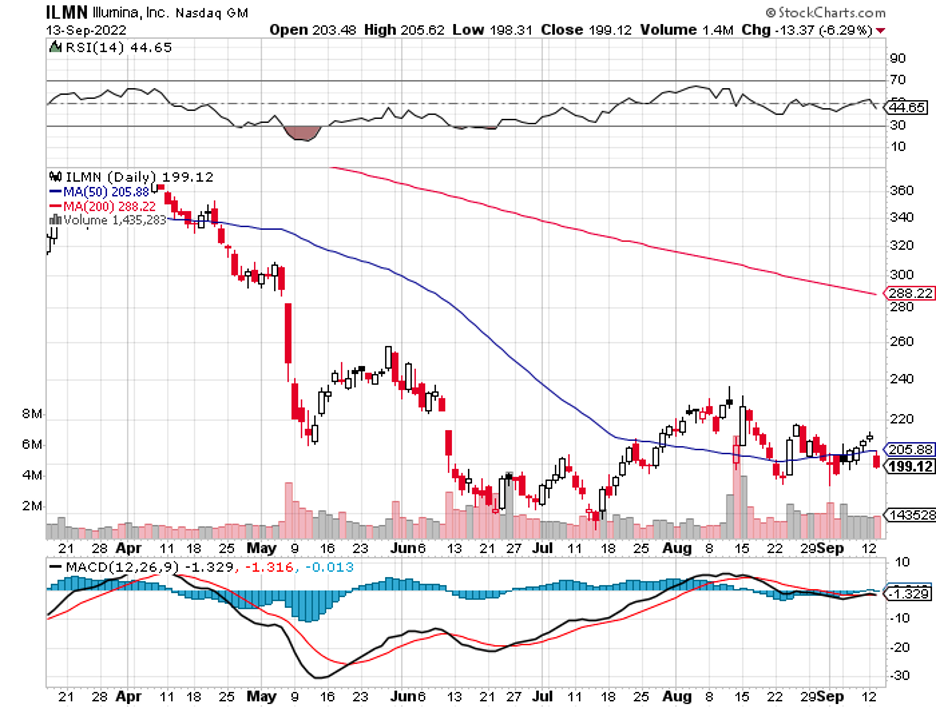A Long-Term High Risk Stock
As Warren Buffett says, it’s wise to be greedy when others are fearful. This is excellent advice these days since we’ve been dealing with fearful times. Even the best growth stocks have been struggling from economic headwinds and the rising panic over interest rate hikes.
That means there are several opportunities for enterprising investors to take advantage of the uncertainties and set themselves up for long-term success by buying quality stocks at discounted prices.
One stock that has been battling issues lately is Illumina (ILMN).
Over the past 10 years, Illumina has delivered 380% returns—resoundingly beating the market’s gain of 241.6%.
To achieve that success, the company sold, installed, and serviced over 20,000 gene sequencer devices, which hospitals and other biomedical centers use to analyze genetic data.
Unfortunately, Illumina’s luck has turned in the last 12 months. The company has been underperforming and has investors worried about the future.
Illumina’s dominance in the sequencer market is one of the significant reasons to invest in its stock.
After all, the significance of genetic information is projected to expand over time. That makes Illumina the clear candidate for a long-term hold despite its current underperformance.
However, it’s understandable for investors to be anxious, especially with the recent move of Europe’s antitrust regulators to bar the $8 billion acquisition of Grail (GRAL).
Here’s a brief background about the deal.
Grail has created a lab test that can identify over 50 types of cancers at their early stages using only a simple blood draw. This is called the Galleri blood test.
Since screenings do not exist for most kinds of cancers, many are not diagnosed until they’re already spread and are, therefore, more challenging to treat.
Although Grail’s test does not promise to detect all cancers, it can catch the 12 most fatal types with roughly 76% accuracy, while its false positives are lower than 1%.
Needless to say, these tests could save thousands of lives annually if adopted across the globe.
This is where Illumina comes in. Since the company develops platforms that sequence genetic tests for various fetal abnormalities and even COVID variants, it has the technology to expand Grail’s operation.
Moreover, Illumina has extensive experience negotiating insurer reimbursements, which means it could accelerate the commercial adoption of Grail’s technology. At the moment, most insurers refuse to cover the costs of Grail’s test.
This resulted in only $12 million in revenue for the company, with over $187 million in operating loss. Grail’s underwhelming performance is one of the reasons investors are baffled over the move to block the acquisition.
Another is that the acquisition does not fall under any of the categories for antitrust reviews under the EU bylaws because Grail does not operate or do any business in Europe.
However, the commissioner decided to invoke a provision under EU’s merger rules that allow member states to reach out to the commission when their governments do not have jurisdiction over the matter. Six countries did so, which led to the review.
The commission is tag-teaming with the US Federal Trade Commission, which also moved to stop the deal in 2021. Both regulating bodies claim that the agreement could impede competition in the embryonic multiple cancer-early detection industry.
According to the EU commission, this acquisition would cut off all of Grail’s rivals in the segment.
This is a tad confusing, though, because Grail has no rivals in the field.
The entire debacle has the scientific community wondering over the real reason, especially since Illumina developed the technology Grail used. Then, it was spun off for financing purposes, but Illumina still retained 20% ownership. Now, the company is merely taking it all back again by acquiring it.
It remains to be seen what will happen in the following months as Illumina plans to appeal the decision.
But why is Illumina still pushing through with this deal?
The reality is that the genetic testing industry is a bloodbath. It can take years for a single genetic test to complete clinical trials, receive regulatory approval, and achieve insurance coverage. This struggle is apparent in so many clinical laboratories such as Exact Sciences (EXAS), Invitae (NVTA), Guardant Health (GH), and Natera (NTRA). Even Grail lost so much while developing its cancer blood test.
Meanwhile, Illumina chooses to market clinical tests its clients have already pioneered. That way, it can still gain profits as a supplier of sequencing tools.
Hence, having Grail back in its portfolio would be a cherry on top of its current strategy.
Looking at the situation right now, it’s a mess. Nevertheless, Illumina’s main line of business is a significant segment to be a part of in the coming years.
I don’t think the company would spend this much time and effort on Grail unless the future payoff would be substantial. Think about it: detecting cancers early? How incredible is this technology? How many lives would be saved because of it?
The long-term investing thesis for betting on Illumina is that it’ll most likely continue to deploy its gene sequencing devices globally, generating more recurring revenue flows in the process.
Simultaneously, the company can expand its domain knowledge and gather a copious amount of data for R&D that would equip it against competitors.
Basically, it has found a way to lock in customers for years while being several steps ahead of its rivals.
As confusing and grim the situation may be, for now, I believe Illumina stock is an excellent investment with or without Grail (but I hope it finds a way to be with it).


